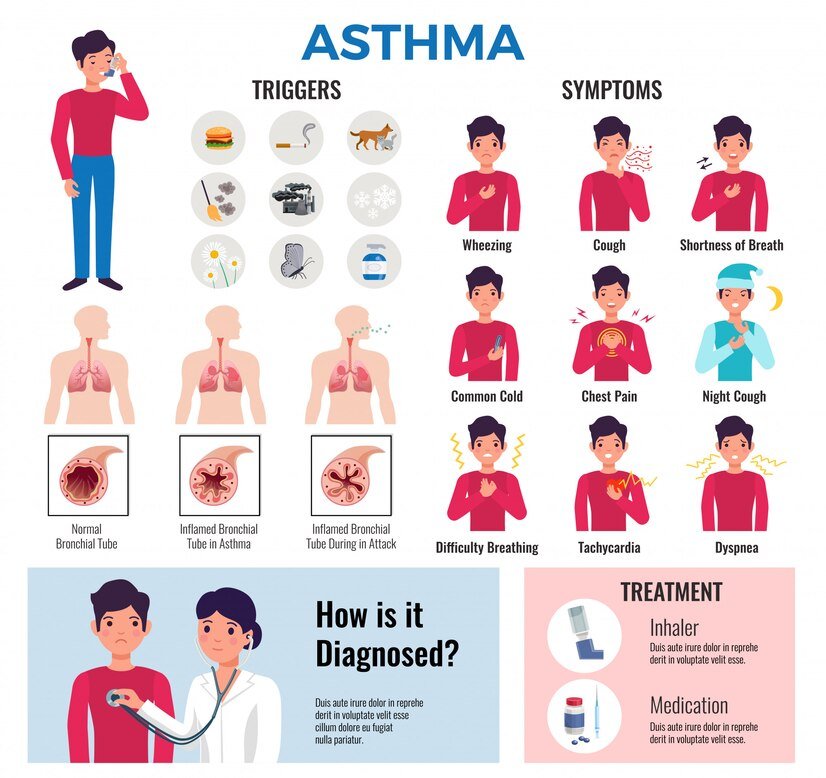Texas is a state with diverse topography and bustling metropolises. These same characteristics can trigger asthma or allergy symptoms. Don’t worry about sneezing, wheezing, or having red eyes—there are remedies that work! In this blog, we uncover the newest allergy and asthma management treatments and discuss approaches to enhancing health.
Introduction to Asthma and Allergies
Allergies and asthma are common illnesses in Texas that result from climatic changes and high pollen counts. Over time, asthma narrows the bronchioles of the lungs and swells the tissues around them. This can easily lead to breathing difficulty, wheezing, coughing, or dyspnea. Allergies result from an overactive immune response towards things like dust, pollen grains, animal fur, or certain foods, causing sneezing, watery eyes, and itching.
Common Asthma and Allergy Symptoms
Understanding symptoms is key to managing and treating allergies and asthma.
Asthma Symptoms:
- Difficulty breathing
- Wheezing
- Coughing, especially at night or early morning
- Tightness in the chest or aching chest pain
Allergy Symptoms:
- Sneezing
- Runny or blocked nose
- Watery and itchy eyes
- Skin rashes or hives
- Severe swelling, particularly of the lips, mouth, or face
Benefits of Visiting Urgent Care for Treatment
Going to an urgent care center for allergy and asthma treatment has several benefits, including:
- Accessibility: Extended hours and weekend operations mean you can be treated when you need it.
- Immediate Attention: Urgent care centers provide faster service than emergency rooms, reducing patient wait time.
- Comprehensive Care: Treatment for a wide range of allergy and asthma symptoms.
- Cost-Effective: More affordable than emergency room visits for non-life-threatening conditions.
- Convenience: On-site laboratories and pharmacies for quick diagnosis and treatment.
Latest Asthma and Allergy Treatment Options

Progress in medical research has led to novel and effective allergy and asthma treatments:
- Nebulizers and Inhalers: These devices aid in reducing inflammation and freeing airways by delivering drugs into the lungs. Small inhalers are easy to use, while nebulizers are appropriate for more severe cases.
- Immunotherapy (Allergy Shots): Gradually increases the body’s tolerance to allergens through regular injections.
- Biological Medications: These recent medications help prevent asthma and allergy attacks by targeting specific immune system components. Examples include Omalizumab (Xolair), which is used for asthmatic patients, or sarilumab (Dupixent), which is meant for those with eczema and nasal polyps.
- Antihistamines and Decongestants: These drugs relieve allergies by blocking histamine or reducing nasal congestion.
- Leukotriene Modifiers: Some drugs like montelukast (Singulair) may reduce inflammation as well as minimize mucus secretion in asthma.
Tips for Managing Asthma and Allergies
Combining medications and lifestyle changes can help manage asthma and allergies. Consider these guidelines:
- Identify Triggers: Know what triggers your symptoms and avoid them when possible. Some common triggers include pollen, dust mites, pet dander, smoke, and strong odors.
- Keep Your Surroundings Clean: Regularly clean your home, use air purifiers, vacuum frequently, and wash bedding in hot water to reduce allergens.
- Watch Air Quality: Monitor daily air quality reports and avoid going outside during high pollen or pollution days.
- Follow Treatment Plans: Take all your prescribed medications by doctors and use inhalers or other devices as recommended.
- Exercise Regularly: Regular exercise will help improve lung function and overall health. Choose activities that are less likely to cause attacks, like swimming or walking.
- Eat Healthy: Add a lot of fruits and vegetables to your diet for an improved immune system.
- Stay Hydrated: Water in large amounts thins mucus and moistens the respiratory tract sufficiently.
Conclusion
Having asthma or allergies doesn’t mean you have to limit your life in Texas. Understanding your condition, seeking early medical attention, and implementing preventive measures can help you live a healthy, unrestricted life.
At CareFront Medical Group, our qualified staff offers proper diagnosis and treatment for asthma and allergies in a professional and friendly manner. Our emergency services and consultation with physicians ensure comprehensive allergy relief and asthma care. Book a session today and take charge of your health.
FAQs About Allergy & Asthma:
Q: What is the possibility of curing asthma?
A: Asthma is a long-term disease, but it is manageable with the help of proper medication and lifestyle adjustments. While there is no complete cure, symptoms can be effectively controlled.
Q: Is it true that allergy and asthma are related?
A: Yes, there is a positive association between them. Individuals with asthma are likely to have allergies or vice versa.
Q: What are the complications of allergy shots?
A: Possible side effects of the vaccine are pain, warmth, redness, and swelling at the site of administration. Less common side effects include cold-like symptoms, sneezing, or headache. Always discuss potential side effects with your doctor.

